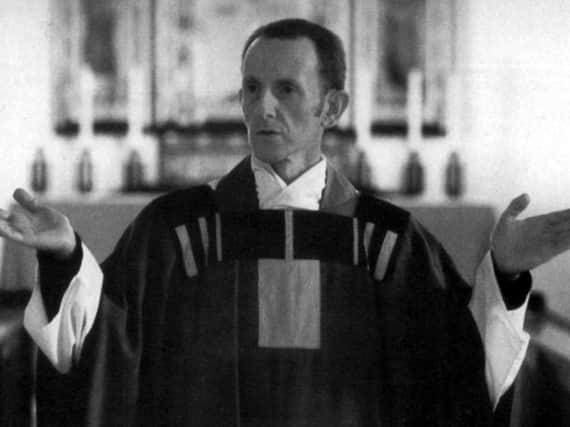Life of gay Sheffield priest who died from AIDS chronicled as moving book is re-published


The Rev. Simon Bailey, who was rector of Dinnington and who died from the illness more than 20 years ago, is the focus of a book by the priest's sister and journalist Rosemary Bailey whose book, Scarlet Ribbons: A Priest With AIDS, is set to hit book shelves again.
The new edition of the 1997 book is the true story of how the South Yorkshire pit village took care of their dying priest and coincides with the 50th anniversary of the passing of the Sexual Offences Act 1967, which partly decriminalised homosexuality.
Advertisement
Hide AdAdvertisement
Hide AdA few weeks before he started work in Dinnington, Simon was diagnosed as HIV-positive at age 30 and the book tells his ten year-ordeal from diagnosis to death.
Said Rosemary: "The future looked bleak. It was 1985, the 'gay plague' was still only a frightening rumour.
"Death from AIDS seemed inevitable. Not to mention death by media. Or simply disapproval."
"For years Simon kept the knowledge of his diagnosis secret – from his strict fundamentalist Baptist father, his mother and the rest of the family, from his friends and lovers, from the Bishop and from his parishioners."
Advertisement
Hide AdAdvertisement
Hide AdHe immersed himself in the parish of St Leonard’s, getting to know everyone, from the miners to the schoolchildren, the butchers to the hairdressers.
Dinnington was still reeling from the miners’ strike of 1984 and Simon embarked on plans for a permanent memorial to the miners in the church. He led his parishioners on retreats to Holy Island and other sacred sites.
Added Rosemary: "By the time he finally became ill, about seven years after diagnosis, a core group of supporters who loved him declared their willingness to support him. There was no question that he should stay. Some, including the hairdresser and the church warden, were not so sure.
"Eventually he told the family. Their main worry was the media – two of them were journalists and had little trust in their profession.
Advertisement
Hide AdAdvertisement
Hide Ad"Someone from the village called The Sun and a local stringer came round to the Rectory. The reporter said later, “It was obvious he had AIDS, but he didn’t want to talk.” Despite everyone’s fears, the reporter did not write the story."
Simon became increasingly ill and seemed close to death. Stomach problems meant he needed intravenous feeding, which required 24-hour supervision. The hospital said it was impossible for him to do this at home. But Simon was determined to continue in his ministry. It was what was keeping him alive.
The parish responded, stating "we will look after you," setting up a rota of people to stay with him.
A visiting archdeacon observed the prayer meeting in the rectory, everyone seated comfortably round Simon on his IV drip, and suggested that the story could be made public.
Advertisement
Hide AdAdvertisement
Hide AdThere was of course much debate, but eventually it was agreed to make a BBC documentary. It was broadcast in 1994 and received a deluge of response.
And then Rosemary began to write the story, plunging herself into the world of Dinnington and the church. And AIDS.
For the next year she interviewed Simon, his parishioners, their mother.
She said: "Simon encouraged me and saw drafts of the early chapters. He died in November 1995, having survived two years longer than his doctors thought possible. Only two weeks before he died he offered communion in his beloved church for the last time."
Advertisement
Hide AdAdvertisement
Hide AdScarlet Ribbons was first published in 1997 but is now back in shops twenty years on.
She said: “More than ever it’s “a story for our time.
"The Anglican Church is still torn about homosexuality and gay marriage, and Northern towns like Dinnington are more neglected and alienated than ever.”
But above all, she adds, “The way that Simon was stubbornly supported by his parishioners was what made this such a deeply inspiring story to write.”
Rosemary will participate in a service at St Martins in the Fields, on July 29 to mark the 50th anniversary of the Sexual Offences Act 1967 when male homosexuality was decriminalised.